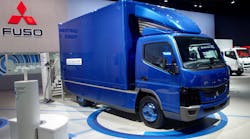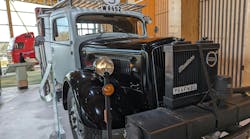HANNOVER, GERMANY. Once skeptical about the practicality of electric-powered commercial vehicles, Daimler Trucks is now planning to bring the Fuso eCanter to the U.S. market next year and to follow with production of electric light trucks from its van group by 2018.
“Ten years ago I saw no market for e-trucks,” said Daimler Truck head Wolfgang Bernhard during a press conference at the IAA 2016 commercial vehicle show. “What happened? Battery technology has change drastically driven by the cellphone industry. There’s been a 2½-fold increase in performance and 2½-fold decrease in cost.”
Still unconvinced that there are long-haul e-trucks in the near future, Bernhard now believes the technology has reached the tipping point for urban delivery applications. And while longer average route differences and less urban density in the U.S. are challenging for EVs, he said significant customer demand exists, so the company will begin limited sales of its eCanter here next year with broader availability in 2018 and even possible local production.
The electric truck will have the same horsepower and torque as the diesel Cantor, as well as the same 7,500-lb. GVW. Payload will be around 4.6 tons depending on the number of batteries installed. Both mechanical and electric PTS’s will be available for refrigeration units and other powered accessories.
Daimler also used IAA to showcase two all-electric concept vehicles – a heavy-duty Urban eTruck and a package delivery Vision Van – as well as announced a commitment from the Daimler Van group to begin series production of an electric commercial van by 2018.
American fleet interest in buying e-trucks is “very high, even higher than in Japan,” according to Marc Llistosella, head of Daimler Trucks Asia and the Fuso brand. The traditional barriers to adoption have been limited range and fast-charging infrastructure as well as initial cost, he said at a press conference during IAA. He believes the eCanter and some new support programs address those issues.
Battery advances give this new generation electric Canter a range of 100 km when it’s equipped with five modular battery packs, and work is ongoing to extend that to 150 km, Llistella said. And customers can choose to fit the truck with as few as three battery packs or as many as six depending on their range and payload needs.
As for pricing, Fuso says there will be a two- to three-year ROI on the price premium over a diesel powered Canter. The company also plans to address residual value concerns by leasing the battery packs separately and replacing them with new, presumably more advance batteries every two or three years.
While every eCanter will come with an AC charging system, the 12 hours required to fully recharge the vehicle won’t suit fleets that don’t park trucks overnight. Faster DC “superchargers” reduce that time to around an hour, but cost considerably more to install. So Fuso expects to help subsidize the building of that infrastructure with other willing partners in a few markets where there is enough density to warrant it, according to Llistosella. He indicated that California would be a logical location for a supercharging network.
The eCanter will be introduced next year simultaneously in the U.S., Japan and Germany with a soft launch and “small-scale production,” Llistosella said.



